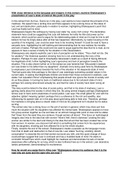Essay
King Lear Essay - With close reference to the language and imagery in this extract, examine Shakespeare’s presentation of Lear’s state of mind at this point in the play
- Course
- Institution
- Book
This document is an essay for the GCSE and A-Level text, King Lear by Shakespeare. I personally created these revision notes while studying for my A-Levels between . I achieved a grade A* in English Literature, which is reflected in these notes. They are perfect for last minute revision, or if you ...
[Show more]




